
BOSTON (TND) — The Boston People’s Reparations Commission demanded Saturday churches in the city provide Black residents with reparations, according to several local outlets.
Kevin Peterson, a civil rights activist with the organization, reportedly argued Boston churches propagated slavery.
Many of the well-known white churches in downtown Boston are connected to the slave trade and the proliferation of what was a ‘slavetocracy’ in our city,” he claimed, according to WHDH.
John Gibbons, a unitarian church minister, purportedly stated religious officials were among Boston leaders most likely to enslave people.
“Beginning in the 17th century, all of our colonial churches were founded on the profits of slavery,” he said, according to WHDH. “Colonial ministers were among the most likely to have enslaved servants.”
READ MORE | Maryland considering reparations bill that would raise taxes for ‘reinvestment’ fund
The commission has previously called for Boston to pay $15 billion for its role as the center of the New England slave trade. Approximately 12% of the city’s population was enslaved people in the early 1700s.
What we’re doing is we’re mobilizing, having conversations, educating the community about Boston’s role in the transatlantic slave trade, the disparities within the communities, and we’re working towards gathering stories to figure out solutions,” Heather Cook, one of the organization’s commissioners, noted, according to WCVB.
The New Democracy Coalition, which created the Boston People’s Reparations Commission, has previously pushed the city to recognize enslaved people’s contributions. The coalition began asking Boston to rename Faneuil Hall, an 18th-century marketplace, in 2018 due to the architect of the center’s reliance on slavery.
The city created a reparations task force in 2022 to provide Mayor Michelle Wu reparative justice recommendations for Black residents. It focuses on researching slavery’s impact on Bostonians and hearing input from Boston residents.
“Even after Massachusetts outlawed slavery, our region continued to benefit from the labor of enslaved people,” Wu said last year. “That legacy formed deep, painful and lasting systems of exclusion and inequity that persist to this day.”
READ MORE | ‘Squad’ member calls for slave descendants to get $333K each: ‘Do the right thing’
In 2020, a 17th century church in the city found at least 219 enslaved people were connected to its history, with 32% of the institution’s funding coming from known enslavers.
“The story of slavery at King’s Chapel is one of power and wealth, pain and oppression, strength and resilience and more,” the report read. “It is an honest story of the real people who shaped this church’s history.”
Follow Ray Lewis on X for trending national news @rayjlewis or send a tip to rjlewis@sbgtv.com.

